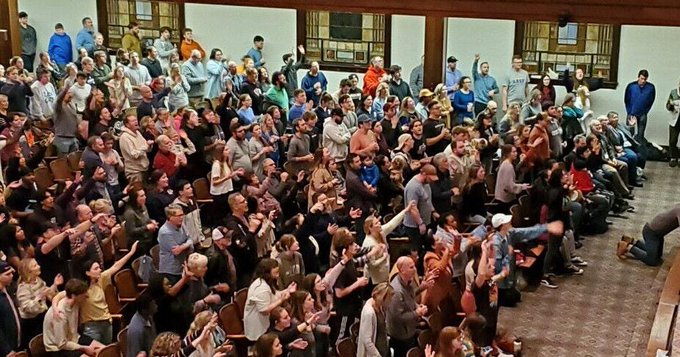
Chris Lange, FISM News
[elfsight_social_share_buttons id=”1″]
An Asbury Theological Seminary professor recently suggested that the word “outpouring” may be a better word than “revival” to describe the campus marathon worship services that began at the Wilmore, Kentucky campus Feb. 8 and have since swept colleges and universities across the nation and beyond.
Stephen Seamands, professor of basic Christian doctrine at Asbury Seminary, said that it could take church historians years — possibly even decades — to settle on the appropriate label for what has been taking place, according to a report by The ScotFree.com. The remarks were made during a question-and-answer session at Harris Creek Baptist Church in Waco, Texas on Sunday.
Seamands said that several factors will determine how history looks back at the Asbury outpouring, including “the long-term effect it has on people’s lives, on the church,” noting that real “revival leads to a kind of a penetration phase, where people are evangelized, and … social evils are confronted.”
HOPE FOR GENERATION Z
The college students who sparked and continue to drive the outpouring are likely far less preoccupied than adults with settling on the right nomenclature to describe what they have experienced over the past three weeks.
Students engaging in round-the-clock worship services at dozens of campuses across the country have added kindling to the fire sparked at Asbury in a manner in which these Gen Zers are particularly adept: social media live streaming. The Cincinnati Enquirer reported on Thursday that student-generated posts with the #AsburyRevival hashtag had generated 116.1 million views on TikTok.
This instinctive penchant for digital disclosures among young Americans has fueled the spread of the outpouring not only to other campuses but to other parts of the globe, as well. The phenomenon is all the more compelling given recent, rather grim reports indicating that religious faith among Gen Zers was lingering on life support, at best.
The New York Times recently reported that Generation Z is the least religious generation in American history, noting that a full one-third of this group identifies as being religiously unaffiliated. In other words, they claim no ties whatsoever to any religious group. FISM reported earlier this month that only a quarter of Gen Zers said that they regularly attend church.
The outpouring has drawn comparisons to the Jesus Movement of the ‘60s and ‘70s, a period of Christian revival in the U.S. in which Asbury played a key role with another student-led faith awakening that has since been labeled, or at least is commonly referred to as, a “revival.” The Jesus Movement is the subject of the new “Jesus Revolution” film that debuted in theaters on Friday.
Seamands, in fact, attended the 1970 Asbury revival.
“That was God’s way, I think, of reaching out to my generation, the baby boomers,” he said. “But this [2023] is about Gen Z. This is about millennials and Gen Z. They’re the heart and soul of this, of what’s going on. And I believe that Jesus is chasing after and giving Himself to a generation that has been through perhaps more tough stuff than any other generation in American history,” he continued. “I really believe that God wants to bring revival.”
The Asbury outpouring was moved off-campus on Friday, though Asbury President Dr. Kevin Brown asserted at the time that the venue change did not reflect any attempt to “stop” the revival, but rather was borne out of necessity. The massive growth of the outpouring rapidly outpaced school resources and disrupted classes.
One Twitter user posted a notice that the services had been moved to Rupp Arena in Lexington, roughly 15 miles away from the Wilmore, Kentucky campus, though it is not clear whether that service has continued or was only for the day.
Rupp Arena is the home of the University of Kentucky basketball team.
